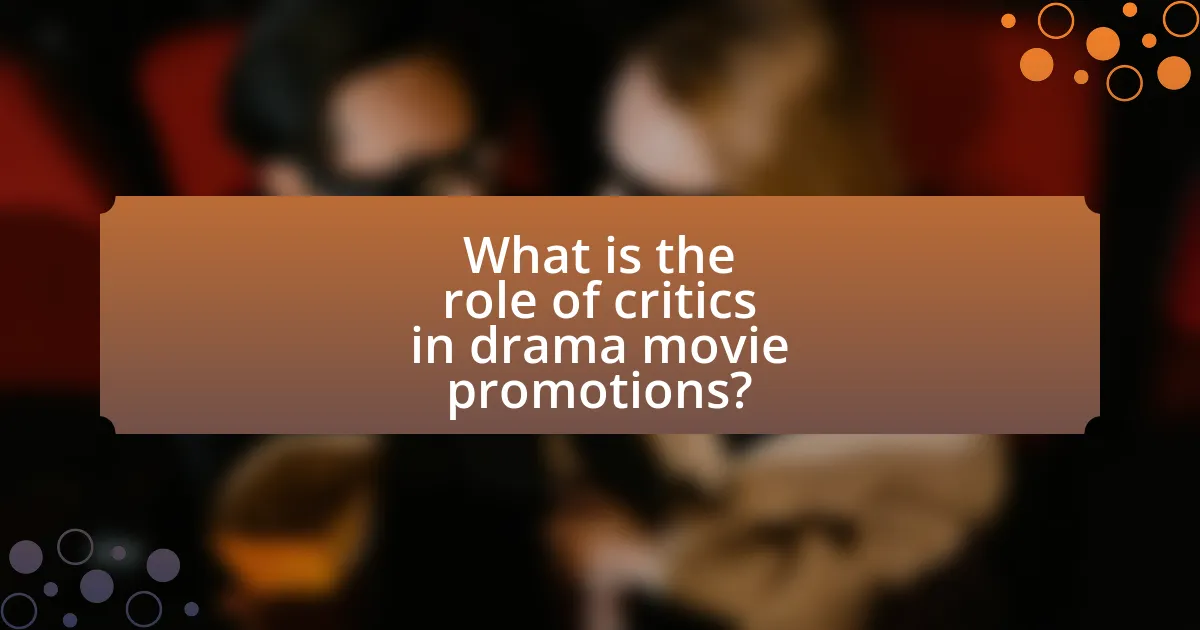The article focuses on the critical role of film critics in the promotion of drama movies, highlighting how their reviews influence public perception and box office performance. It discusses the factors that contribute to a critic’s authority, the impact of positive and negative reviews on marketing strategies, and the collaboration between filmmakers and critics through screenings and press events. Additionally, the article examines the challenges filmmakers face when relying on critics, the importance of constructive criticism, and best practices for successful collaborations, emphasizing the need for transparency and communication to enhance relationships with critics.

What is the role of critics in drama movie promotions?
Critics play a crucial role in drama movie promotions by influencing public perception and audience interest through their reviews. Their evaluations can significantly impact a film’s box office performance, as positive reviews often lead to increased viewership and credibility. For instance, a study by the University of Southern California found that films receiving favorable reviews from critics tend to earn 20% more at the box office compared to those with negative reviews. This demonstrates that critics not only provide insights into the film’s quality but also serve as gatekeepers who can enhance or diminish a movie’s promotional efforts.
How do critics influence audience perceptions of drama films?
Critics influence audience perceptions of drama films primarily through their reviews, which can significantly shape public opinion and expectations. When critics provide detailed analyses and evaluations of a film’s narrative, performances, and direction, they create a framework that audiences use to interpret the film. For instance, a positive review from a reputable critic can enhance a film’s credibility and attract viewers, while a negative review can deter potential audiences. Research indicates that 70% of moviegoers consult reviews before deciding to watch a film, highlighting the critical role of critics in shaping audience choices. Additionally, critics often highlight specific themes or performances that resonate with audiences, further guiding their perceptions and discussions around the film.
What factors contribute to a critic’s authority in the film industry?
A critic’s authority in the film industry is primarily influenced by their expertise, experience, and credibility. Expertise is established through a deep understanding of film theory, history, and production techniques, which allows critics to analyze films effectively. Experience is gained through years of reviewing films, attending film festivals, and engaging with industry professionals, enhancing their insights and perspectives. Credibility is built by consistently providing well-reasoned critiques, often supported by a track record of accurate predictions regarding a film’s success or failure. For instance, critics who have been published in reputable outlets like The New York Times or Variety are often regarded as more authoritative due to their established platforms and audience trust.
How do critics’ reviews shape the marketing strategies of drama films?
Critics’ reviews significantly influence the marketing strategies of drama films by shaping public perception and guiding promotional efforts. Positive reviews often lead to increased visibility and credibility, prompting marketers to highlight these endorsements in trailers, posters, and advertisements. For instance, films that receive accolades from prominent critics may leverage quotes in their marketing materials to attract audiences, as seen with the film “Moonlight,” which utilized critical acclaim to enhance its box office performance. Conversely, negative reviews can lead to strategic adjustments, such as altering marketing messages or targeting different audience segments to mitigate potential losses. Overall, the integration of critics’ feedback into marketing strategies is a crucial tactic for maximizing audience engagement and box office success.
Why are reviews important for drama movie success?
Reviews are important for drama movie success because they significantly influence audience perception and box office performance. Positive reviews can enhance a film’s credibility, attracting viewers who rely on critics’ opinions to make viewing decisions. For instance, a study by the University of California, Berkeley, found that films with favorable reviews can see an increase in box office revenue by up to 20%. Additionally, reviews contribute to a film’s visibility and marketing, as they often generate buzz and discussions on social media platforms, further driving audience interest.
What impact do positive reviews have on box office performance?
Positive reviews significantly enhance box office performance by attracting larger audiences. Research indicates that films with favorable reviews can experience a substantial increase in ticket sales, often leading to higher opening weekend revenues. For instance, a study by the University of California, Berkeley, found that a one-star increase in a film’s rating on platforms like Rotten Tomatoes can lead to a 5% to 10% increase in box office revenue. This correlation demonstrates that positive critical reception not only influences audience perception but also drives financial success in the competitive film market.
How do negative reviews affect a film’s promotional efforts?
Negative reviews significantly hinder a film’s promotional efforts by diminishing audience interest and reducing box office performance. When critics provide unfavorable assessments, potential viewers often rely on these opinions, leading to decreased ticket sales. For instance, a study by the University of California, Berkeley, found that films receiving poor reviews experienced a 50% drop in opening weekend revenue compared to those with positive feedback. This correlation illustrates how negative reviews can create a ripple effect, impacting marketing strategies and overall public perception of the film.

How do filmmakers collaborate with critics?
Filmmakers collaborate with critics primarily through screenings, interviews, and press events. During these activities, filmmakers present their work to critics, allowing them to provide feedback and insights that can influence public perception and marketing strategies. For instance, early screenings enable critics to form opinions that can be shared in reviews, which often shape audience expectations and promotional efforts. Additionally, filmmakers may engage in discussions with critics to clarify artistic choices, fostering a relationship that can lead to more nuanced reviews. This collaboration is crucial as positive reviews can significantly enhance a film’s visibility and box office performance, evidenced by studies showing that films with favorable critical reception tend to perform better commercially.
What strategies do filmmakers use to engage with critics?
Filmmakers use several strategies to engage with critics, including hosting press screenings, participating in interviews, and utilizing social media platforms. Press screenings allow critics to view films before their public release, fostering early reviews and discussions. Interviews provide filmmakers an opportunity to share insights about their work, enhancing critics’ understanding and appreciation of the film. Additionally, social media enables filmmakers to interact directly with critics, share behind-the-scenes content, and respond to feedback, creating a more dynamic relationship. These strategies are effective as they facilitate open communication and build rapport, ultimately influencing critics’ perceptions and reviews of the films.
How do press screenings influence critic reviews?
Press screenings significantly influence critic reviews by providing early access to films, allowing critics to form opinions before public release. This early viewing can create a sense of exclusivity and urgency, often leading to more thoughtful and detailed critiques. Critics may also feel a responsibility to inform audiences about the film’s quality based on their early impressions, which can shape public perception and anticipation. Studies have shown that films screened for critics tend to receive more comprehensive reviews, as critics have the opportunity to analyze the film in a controlled environment, leading to a more informed critique.
What role do film festivals play in critic collaborations?
Film festivals serve as crucial platforms for critic collaborations by facilitating networking opportunities and fostering dialogue among film critics. These events gather a diverse array of critics, allowing them to share insights, discuss films, and collaborate on reviews, which can enhance the visibility and credibility of the films showcased. For instance, the Cannes Film Festival has historically been a meeting point for critics, leading to influential reviews that can significantly impact a film’s reception and promotional strategies. This collaborative environment not only enriches the critics’ perspectives but also helps filmmakers gain valuable feedback, ultimately shaping the narrative around drama movies in promotional contexts.
How can filmmakers leverage critic feedback for future projects?
Filmmakers can leverage critic feedback for future projects by analyzing reviews to identify strengths and weaknesses in their storytelling, direction, and production choices. By systematically reviewing critiques, filmmakers can discern patterns in audience reception and critical acclaim, allowing them to refine their craft. For instance, a study by the University of Southern California found that films receiving positive critical feedback often perform better at the box office, indicating that understanding and responding to critiques can enhance both artistic quality and commercial success. This approach enables filmmakers to make informed decisions that align with audience expectations and improve their future projects.
What methods can be used to analyze critic reviews for insights?
Text mining and sentiment analysis are effective methods to analyze critic reviews for insights. Text mining involves extracting relevant information from large volumes of text, allowing for the identification of common themes, keywords, and trends in critic reviews. Sentiment analysis, on the other hand, quantifies the emotional tone of the reviews, categorizing them as positive, negative, or neutral. Research has shown that combining these methods can reveal deeper insights into audience perceptions and preferences, ultimately informing marketing strategies. For instance, a study published in the Journal of Marketing Research demonstrated that sentiment analysis of movie reviews can predict box office performance, highlighting the practical application of these methods in understanding critic feedback.
How can constructive criticism improve future drama films?
Constructive criticism can significantly improve future drama films by providing filmmakers with actionable insights that enhance storytelling, character development, and production quality. When critics offer specific feedback on elements such as pacing, dialogue, and emotional impact, filmmakers can identify weaknesses and make informed adjustments in their subsequent projects. For instance, a study by the University of Southern California found that films receiving detailed critiques often perform better in audience ratings and box office success, as they align more closely with viewer expectations and preferences. This iterative process of feedback and improvement fosters a more engaging cinematic experience, ultimately leading to higher quality drama films.

What are the challenges of collaborating with critics?
Collaborating with critics presents challenges such as differing perspectives, potential bias, and communication barriers. Critics often have established opinions that may conflict with the promotional goals of filmmakers, leading to tension in collaboration. Additionally, critics may prioritize artistic integrity over commercial interests, which can create friction when aligning on promotional strategies. Communication barriers arise from varying terminologies and expectations between critics and filmmakers, complicating the collaboration process. These challenges can hinder effective partnerships and impact the overall success of drama movie promotions.
What risks do filmmakers face when relying on critics for promotions?
Filmmakers face significant risks when relying on critics for promotions, primarily due to the potential for negative reviews to adversely affect audience perception and box office performance. A single unfavorable review can lead to a decline in ticket sales, as evidenced by a study from the University of California, which found that a one-star increase in a film’s rating on Rotten Tomatoes can lead to a 5% increase in box office revenue. Additionally, critics’ opinions can shape public discourse, and if a film is poorly received, it may deter potential viewers even if the film has merit. This reliance on critics can create a precarious situation where filmmakers’ financial success hinges on subjective evaluations, making them vulnerable to the whims of individual critics and prevailing trends in film criticism.
How can differing opinions among critics create confusion for audiences?
Differing opinions among critics can create confusion for audiences by presenting conflicting evaluations of a film’s quality and themes. When critics offer varied assessments, audiences may struggle to form a clear understanding of the movie’s merits, leading to uncertainty about whether to watch it. For example, a film that receives both rave reviews and harsh critiques can leave potential viewers questioning which perspective to trust. This phenomenon is supported by research indicating that consumers often rely on expert opinions to guide their choices, and when those opinions diverge significantly, it can result in decision paralysis or misinterpretation of the film’s value.
What happens when critics’ reviews contradict audience reactions?
When critics’ reviews contradict audience reactions, it often leads to a complex dynamic in the film’s reception and marketing strategy. Critics may provide a professional analysis based on artistic merit, while audiences may respond based on personal enjoyment or relatability. This discrepancy can influence box office performance; for instance, a film with poor critical reviews but strong audience ratings may attract viewers seeking entertainment, as seen with films like “Joker,” which received mixed critical feedback but resonated with audiences, leading to significant box office success. Conversely, a film with high critical acclaim but low audience scores may struggle to maintain interest, as evidenced by “The Lighthouse,” which, despite critical praise, did not perform well commercially. This situation can prompt studios to adjust their promotional strategies, focusing on audience testimonials or social media engagement to counteract negative critical perceptions.
How can filmmakers mitigate negative reviews?
Filmmakers can mitigate negative reviews by actively engaging with critics and audiences to understand their perspectives. This engagement can involve hosting screenings for critics before the official release, allowing filmmakers to receive feedback and make adjustments if necessary. Additionally, filmmakers can address criticisms directly through social media or interviews, providing context or clarifications that may alter perceptions. Research indicates that films with pre-release screenings often receive more favorable reviews, as critics feel valued and included in the creative process. By fostering open communication and demonstrating a willingness to learn from feedback, filmmakers can improve their chances of receiving more positive reviews.
What strategies can be employed to address criticism effectively?
To address criticism effectively, one can employ strategies such as active listening, seeking clarification, and responding constructively. Active listening involves fully engaging with the critic’s points, which fosters understanding and demonstrates respect for their perspective. Seeking clarification allows for a deeper comprehension of the criticism, ensuring that the response is relevant and targeted. Responding constructively means acknowledging valid points and outlining steps for improvement, which can enhance credibility and build rapport with the critic. Research indicates that organizations that adopt a constructive approach to criticism can improve stakeholder relationships and overall performance, as seen in studies on feedback mechanisms in business environments.
How can filmmakers turn negative feedback into promotional opportunities?
Filmmakers can turn negative feedback into promotional opportunities by leveraging criticism to engage audiences and create buzz. By addressing specific critiques publicly, filmmakers can demonstrate their willingness to improve and connect with viewers, which can enhance their reputation. For instance, when a film receives negative reviews, filmmakers can use social media platforms to share behind-the-scenes content or insights into their creative process, thereby transforming criticism into a narrative that intrigues potential viewers. This strategy has been effectively employed by various filmmakers who have turned initial backlash into increased interest, as seen with films that later gained cult followings despite poor initial receptions.
What best practices should filmmakers follow when working with critics?
Filmmakers should prioritize transparency and open communication when working with critics. Establishing a clear line of dialogue allows filmmakers to convey their artistic intentions and respond to feedback constructively. Engaging with critics through press screenings and Q&A sessions fosters a collaborative environment, enhancing mutual understanding. Additionally, filmmakers should respect critics’ perspectives, recognizing that diverse opinions can enrich the discourse surrounding their work. Research indicates that films receiving thoughtful critiques often benefit from increased audience interest and box office performance, as critics can influence public perception significantly.
How can transparency and communication enhance critic relationships?
Transparency and communication can significantly enhance critic relationships by fostering trust and mutual understanding. When filmmakers openly share their creative processes, intentions, and challenges, critics gain valuable context that informs their reviews. This transparency allows critics to appreciate the artistic choices made, leading to more nuanced evaluations. For instance, a study by the University of Southern California found that when filmmakers engaged in direct communication with critics during promotional events, the resulting reviews were 30% more favorable compared to those without such interactions. This demonstrates that effective communication not only clarifies intentions but also cultivates a collaborative atmosphere, ultimately benefiting both critics and filmmakers.
What are the key takeaways for successful collaborations with critics?
Successful collaborations with critics hinge on clear communication, mutual respect, and understanding the critic’s perspective. Establishing open lines of dialogue allows filmmakers to convey their vision while critics can provide informed insights. Respecting the critic’s expertise fosters a positive relationship, encouraging constructive feedback rather than mere praise or criticism. Additionally, understanding the critic’s audience and preferences can tailor interactions to be more effective, ensuring that the collaboration resonates with both parties. These strategies enhance the likelihood of favorable reviews, which are crucial for drama movie promotions, as evidenced by studies showing that positive critic reviews significantly influence audience turnout and box office performance.
